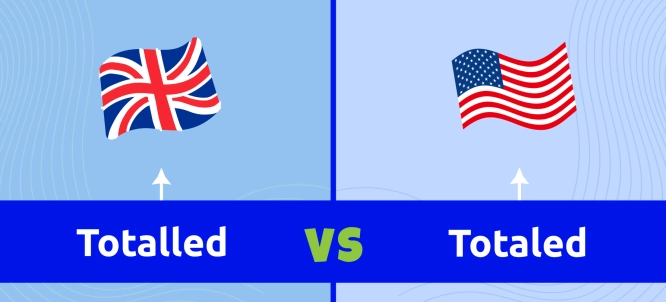by PushtoLearn
Totaled vs Totalled
Table of Contents
US and UK spelling - Exercises and Quiz
These exercises focus on US and UK spelling.
What Do "Totaled" and "Totalled" Mean?
Both "totaled" and "totalled" refer to the past tense of the verb "total," which means to calculate the total amount of something or, more commonly, to completely damage something beyond repair, especially a vehicle.
Example Sentences:
➡️ The car was totaled in the accident. (American English)
➡️ The car was totalled in the accident. (British English)

American English vs. British English
Totaled (American English): In American English, the correct spelling is "totaled" with one "l."
Example Sentence:
➡️ The storm totaled several houses in the neighborhood.
Totalled (British English): In British English, the correct spelling is "totalled" with two "l"s.
Example Sentence:
➡️ The storm totalled several houses in the neighborhood.
Why the Difference?
The difference in spelling comes from a general trend in American English to simplify the spelling of words. In verbs that end with a vowel plus a consonant (like "total"), Americans often add just one "l" when forming the past tense or past participle, while British English often doubles the "l."
Common Errors
Because of the different spellings, students often get confused, especially when switching between American and British English. Here are some tips to avoid mistakes:
⭐ Know Your Audience: Use "totaled" if you're writing in American English and "totalled" if you're writing in British English.
⭐ Consistency: Stick to one form throughout your writing. Don’t mix "totaled" and "totalled" in the same text.
FAQ
Is "totalled" wrong in American English?
It’s not commonly used and is considered incorrect in American English. The preferred spelling is "totaled."
Can "totaled" be used in British English?
While British English typically uses "totalled," "totaled" may be understood but is less common.
Why do British and American English have different spellings?
The differences are due to the way English evolved separately in the U.S. and the U.K. over time. American English often simplifies spellings.
Are there other words with similar spelling differences?
Yes, words like "travelled" (British) vs. "traveled" (American) and "cancelled" (British) vs. "canceled" (American) follow the same pattern.
Should I always use one form of English?
It’s best to stick to one form of English depending on your audience or the region you're writing for. Consistency is key.

